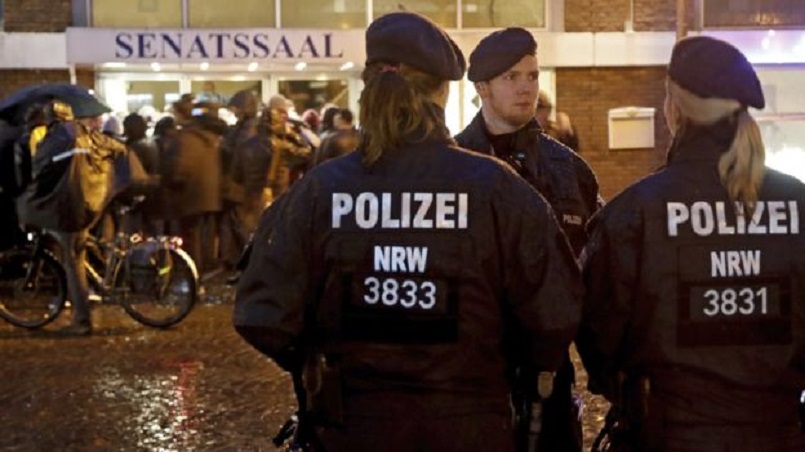
Turkey's president has compared German officials to Nazis, in the latest escalation in a war of words.
Recep Tayyip Erdogan hit out after German authorities cancelled rallies designed to woo ethnic Turkish voters in Germany ahead of a key referendum.
"Your practices are not different from the Nazi practices of the past," Mr Erdogan said.
German Justice Minister Heiko Maas said the comments were "absurd, disgraceful and outlandish".
About 1.4m Turks in Germany can vote in the April referendum, which could give Mr Erdogan sweeping new powers.
Voters will be asked whether they back a new constitution, which would transform the country from a parliamentary republic into a presidential one.
That would give Mr Erdogan, as president, new powers over the budget and the appointment of ministers and judges, as well as the power to dismiss parliament.
A new low: Analysis by Mark Lowen, BBC News, Istanbul
They are Nato allies and major trading partners but that has not stopped Turkey's president from lashing out at Germany in an exchange you might expect from countries at war.
With a referendum soon to take place in Turkey, German local officials cancelled a political rally of the Turkish diaspora in Germany that Turkey's justice minister had planned to address. Mr Erdogan said that showed Germany had "no relation with democracy".
Berlin was infuriated after a German-Turkish journalist for the newspaper Die Welt was imprisoned in Turkey for alleged terrorism propaganda. Deniz Yucel had written about leaked emails that purport to show the influence of Mr Erdogan's son-in-law, who is the country's energy minister. The German government has called for Mr Yucel's release.
Turkey accuses Germany of harbouring terrorist groups. Mr Erdogan has described the journalist as an "agent" of the PKK Kurdish militants that Germany was "sheltering at the German consulate".
Many see in the president's rhetoric an attempt to win the support of Turkish ultranationalists here before the referendum in April. But in the process, a vital relationship between two countries - Nato partners and major trading allies - has reached a new low.
Speaking to German broadcaster ARD, Mr Maas said banning Mr Erdogan from visiting Germany or breaking off diplomatic ties would "play straight into the arms of [Russian President Vladimir] Putin, which no one wants".
Russia and Turkey have steadily improved ties as both countries' relations with the EU have cooled.
The deputy leader of Chancellor Angela Merkel's Christian Democratic Union party, Julia Kloeckner, said Mr Erdogan was "reacting like a stubborn child who can't get his own way".
Mr Erdogan has come under intense international criticism amid a far-reaching crackdown on his opponents since a failed military coup last year. Dozens of Turkish journalists and writers have been arrested, and a large number of diplomats and soldiers have sought asylum elsewhere.
Against this background, Turkey is targeting the millions of expatriate voters eligible to cast a ballot in the controversial poll - including the 1.4m in Germany.
However, officials have withdrawn permission for rallies in Gaggenau, Cologne and Frechen.
The Gaggenau authorities said there was insufficient space for the rally, while Cologne officials said they had been misled about the purpose of the event.
Addressing the German authorities at a rally in Istanbul on Sunday, Mr Erdogan said: "I thought it's been a long time since Germany left [Nazi practices]. We are mistaken."
His comments were in reference to the German Nazi party, which Adolf Hitler led to power from 1933 and 1945. The Nazis were responsible for the mass murder of six million Jews and millions of other people during, World War II.
The cancellations of the rallies in Germany came as a German-Turkish journalist was detained in Turkey, accused of being a member of the outlawed Kurdish militant group PKK.
Mr Erdogan has called the journalist - who works for well-established German newspaper Die Welt - a "German agent" and accused Germany of "aiding and harbouring terror".
German officials said such allegations were absurd.
Separately, the Austrian chancellor called for an EU-wide ban on political campaigning by Turkish politicians.
"A collective EU response to prevent such campaign events would make sense so that individual countries like Germany where appearances are forbidden don't end up being pressured by Turkey," Christian Kern told German newspaper Welt am Sonntag.
He also said the decades-long talks over Turkey joining the EU should be abandoned because the country had been "trampling on human rights and basic democratic rights".
"We can't continue negotiating about membership with a country that has been distancing itself from democratic norms and rule-of-law principles for years."
Austria has previously said Mr Erdogan cannot campaign in the country over the referendum.
